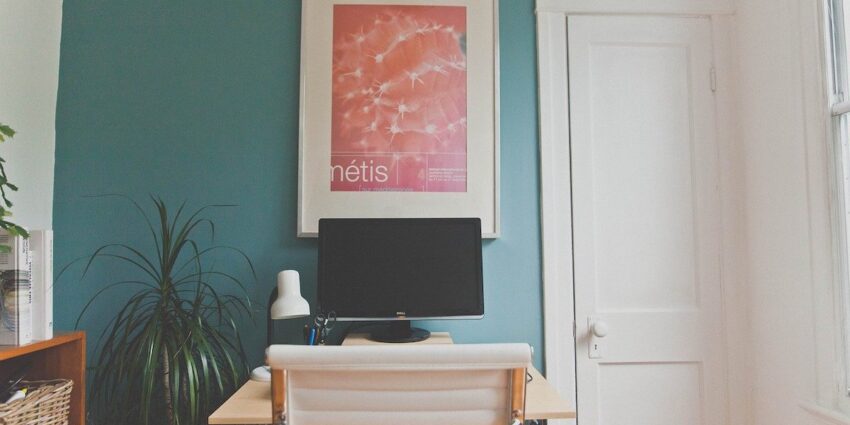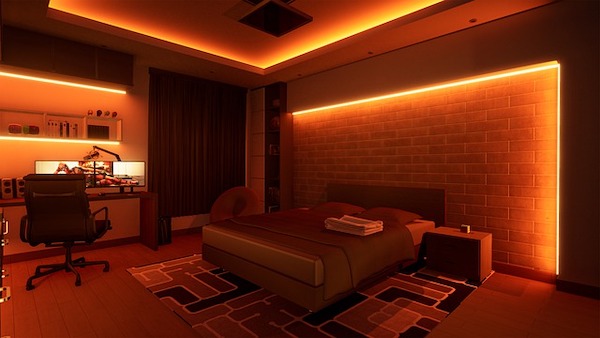Is It Okay to Have Your Home Office in the Bedroom?

Whether you are a full-time remote employee or work from home part of the week, figuring out your home office is key.
The space you set up for your work area can make a difference in your productivity, creativity, and feeling comfortable in getting your work done.
For many, thinking about having their work area in their bedroom appears to be a great idea. And why not, right? Now your morning commute is just a few steps away from your bed!
However, is it okay to have your home office in the bedroom? And where should you ideally set up your remote workspace? What if your bedroom is your only option? Let’s dive in!
Can You Have Your Home Office in the Bedroom?
Yes, it is okay to have your home office in the bedroom, as long as you have a dedicated space in the room and you can separate distractions. However, the bedroom is not an ideal place for long-term remote work but can be sufficient if you are limited in space.
Instead, your bedroom should be a place for sleep, relaxation, and for your own privacy away from other areas of your home or apartment. Combining the two can blur the lines and may be difficult for you to relax or decompress from work.
As much as working from your bed in pajamas may sound great, there are actually quite a few good reasons why you shouldn’t work from your bedroom. Let’s get into those points.
Why You Shouldn’t Work From Your Bedroom
So maybe you are feeling a bit conflicted right now about having your home office in the bedroom. It seems fairly innocent enough, right? However, if you do have the space, I highly recommend that your bedroom is your last option.
After working remotely for over five years full-time.
You’ll eventually feel confined to one room, which can give you mental fatigue
Have you ever gotten a bit “stir crazy” when you feel stuck in the house or apartment? And you start to feel completely bored? A lot of us felt that way during the pandemic when the world was basically shut down.
But this also can happen if you have your home office in your bedroom. You work, sleep, and relax in the same room with no scenery change. It can start to impact you mentally and begin disrupting your sleep and work. Not good!
Can show a lack of professionalism to your manager and co-workers
Generally, you want to leave a great impression on your manager, co-workers, and whoever else you may be working with.
And unfortunately, working from your bedroom can leave professionalism out the window. It can show a lack of seriousness in your work and can also lead to judgments about your “home life.” Not that they should judge you at all, but it's naturally going to happen.
Can be a distraction to your significant other who shares this space
You also need to think about how it impacts your significant other if you do not live alone and share this space.
No longer can you just think about yourself, there is another person to consider. And they have their own schedule and routine, that can be disrupted and cause embarrassing situations. Talk to them first if your room is the only space for an office and don't assume your schedule or setup is fine with this person.
It’s bad for productivity and winding down when it is time to sleep
Your room was never designed as a place to work. So as you bring this home office into this area, you start to internally view this as a place for only work.
This can cause you to lose focus on sleep and unwind from your career. Or because this is a place to relax, your office becomes more of a nap room or you start to lack the focus to get things done.
What is The Ideal Place for Your Home Office?
The ideal place for your home office is to use a spare room in your apartment or home. You don’t need a massive area, just a place to fit a desk and other office essentials. A guest bedroom that can be converted into an office is a great choice.
If your home does not have an open spare room or they are occupied, then it is totally fine to use a regular room that is divided into multiple areas. The usual first choice would be a living room area.
For example, before I moved into my house, I lived in a roughly 850 sq ft apartment. I used the living room/kitchen adjoined area for a small office space facing the wall.
It worked great because I was able to stay out of the bedroom and the other two rooms were to my side. That way on virtual meetings or calls, there were no distractions behind me, just hallway space.
Although, if you have a house with a finished basement, that also can be the ideal location.
If You Must Work From Your Bedroom

Is working from your bedroom going to be a complete disaster for you? Will your employer reprimand you for it? Most likely no, but you want to ensure to separate the home workspace and set boundaries for yourself in the bedroom.
Additionally, not everyone has the space or luxury of dedicating a room or basement to a home office. In fact, a study found that around 38% of remote workers regularly work from bed.
So if you are limited on space, setting up your home office in the bedroom is totally understandable.
Now if you will need your office in the bedroom for the foreseeable future, then there are ways to help ensure success and a positive experience. Here are a few tips to consider.
- Find a corner of the bedroom that will be ideal for your home office. A place to fit your desk, office chair, and make it a product spot.
- Consider separating this home office area from your bed and dressers. You can buy a partition or room divider to help define these two areas. And it’s especially important if you’ll be on a lot of Zoom meetings, considering you probably don’t want managers, co-workers, or anyone you talk to seeing your private space.
- Avoid working in your bed. Maybe you want to move for a bit and chill out from this spot. But a few things. It can be bad for your productivity, decrease your physical health, and is ergonomically tough on your spine and neck over time. Here are some tips if you are having some work from home back problems.
- While tempting to roll out of bed and go right to work, mentally this can impact you. Instead, get prepared for work like you normally would when you are going to the office. Whatever that routine is in the morning or night (if you are working an overnight remote job), stick with it.
- Always keep the room tidy and clean. That means making your bed, putting clothes away, and maintaining organization in your bedroom. The last thing you want is a messy room on virtual meetings for all to see and judge! Of course, you can blur your backgrounds on Zoom or Google, but it’s still good to keep your bedroom organized.
- Get a great computer desk, good lighting, and an ergonomic chair. This way you aren’t tempted to work from your bed or couch that you may have in your room. You want this space to feel like an office, and getting the right equipment is a must. Check out our essential home office gear.
- Ensure your significant other is aware that the bedroom is a home office too. You certainly don’t want them to be caught off guard in a comprising view, i.e. changing clothes in the background during a meeting.
- Stick to a schedule around your work from home breaks and shut things down. You need to set boundaries for your routine and be able to remove work from your bedroom when it’s time for sleep.
- Consider getting a Murphy bed to maximize your bedroom space. These are beds that can fold up or easily be stored to give your room more open space. This can be an option if you have a smaller space and your home office will be in the bedroom.
And one of the best things you can do if you have a bedroom home office is mix up your scenery. Get out of your bedroom office and separate yourself from the house when you can.
For example, head to a coworking space occasionally throughout the week, many remote companies will even cover your costs. Or you can head to a local coffee shop for a few hours, pending it’s not too distracting for you.
Final Thoughts
Working in bed and in your pajamas may sound amazing, but it hurts your productivity and causes you to feel confined to your home over time.
Believe me, I tried a few times early on in a fully remote career and it never worked out well. I quickly learned a dedicated space is an absolute must!
So it’s important to find a more ideal location for your apartment or house, that allows some separation of your work and private life.
However, if you are limited in space, you can have your home office in the bedroom. Just remember to adhere to the tips above to ensure the best situation for working remotely.
Happy Remote Working!








